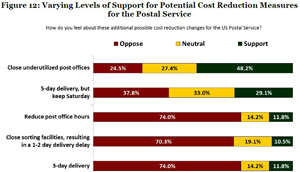Survey Says: Most Americans Oppose Plant Closures
Greg Bell, Executive Vice President
I have always been skeptical of surveys conducted by the Postal Service, because they seem to be designed to generate responses that would justify cutting service, closing postal facilities, or reducing employees’ pay.
But the results of a survey commissioned by the USPS Office of Inspector General (OIG) in February and March validate what postal workers have been saying: The American people want a strong, vibrant postal service.

The survey, which was conducted by InfoTrends, a leading market research firm, found that more than 70 percent of Americans oppose closing mail processing facilities if it would result in a one- or two-day delay in mail delivery. Seventy-four percent of respondents also oppose reducing the hours of operation at post offices.
The study was designed to learn about Americans’ perception of the Postal Service and the role it plays in their lives. It was conducted online because of cost considerations, the OIG said, with the understanding that segments of the population without Internet access (most likely rural and lower-income citizens) could be reached in a future phase of research via mail, phone, or in-person.
Respondents were not made aware the survey was commissioned by the OIG, which is an independent agency within the Postal Service that conducts audits and investigations to maintain USPS “integrity and accountability.” Results were compiled in a report titled What America Wants from the Postal Service — A Survey of Internet-Connected Americans.
Broad Support for USPS
In addition to opposing the reduction of hours at post offices and the closure of mail processing facilities, the survey found, most Americans recognize that the Postal Service provides a public service that should be maintained, even if it is not profitable.
In fact, when asked, “Despite its current financial problems, do you believe the U.S. Postal Service should continue to be required to serve all areas of the country, even if it is not profitable to do so?” 80 percent of Americans who responded said yes. (Among rural respondents 82 percent said yes; 79.3 percent of suburban respondents said yes, and 79.9 percent of urban respondents said yes.) I suspect that if the same question were put to non-Internet connected Americans, the percentage responding “yes” would be even greater.
The survey clearly shows that the American people want the Postal Service to continue to fulfill its legal obligation to provide universal service to the American people at a reasonable and uniform cost.
Although the Postal Service receives no tax dollars to fund its operations, 77 percent of those polled believe — incorrectly _ that the Postal Service is partially- or fully-funded by taxpayers. Of those polled, older Americans are the most likely to know that the Postal Service is self-supporting.
When asked, “If the U.S. Postal Service did not exist in five years, would it have an impact on you,” approximately 95 percent said they would be impacted and about 48 percent said they would be significantly impacted.
One of the most surprising results was that only 5 percent of respondents under the age of 35 said the elimination of the USPS would have no impact on them. This refutes the notion that Internet-savvy young people have no use for the Postal Service. As the report noted, “This finding signifies that the Postal Service has an opportunity to engage these younger Americans and increase its value to them.”
More, Not Less
While most respondents are satisfied with the service and accessibility of their post office, a strong majority indicated they would be interested in more self-service options. The majority of respondents, however, said if they were to have access to postal products and services through an existing non-postal operated retail facility — such as a grocery store or pharmacy — rather than their local post office, it would neither increase nor decrease their use of the Postal Service.
Respondents are generally not opposed to closing post offices to reduce costs, but they are less likely to support the idea if it would result in the closure of their local post office. However, respondents do not support cost-reduction efforts that would delay mail delivery, reduce mail delivery to three days per week, or decrease post office hours.
The majority of respondents are still interested in receiving at least some physical mail. A strong majority of respondents indicated some level of discomfort conducting transactions online, but more than half of those indicated they do so anyway. The majority prefer to receive physical mail over digital messages, although there is at least some interest in receiving specific types of mail electronically rather than physically, such as advertising mail.
Respondents expressed interest in being able to access additional services at post offices, such as renewing drivers’ licenses and obtaining permits. Respondents are also would like the Postal Service to provide digital services, with younger respondents being most enthusiastic of growth in this direction.
We’re Not Alone
Although we are in the forefront of the struggle to protect the Postal Service, we are not alone. As the survey demonstrates, significant majorities of the American people believe the Postal Service remains relevant and important to their daily lives.
As more people wake up to what is being done to the Postal Service, their opposition to cutbacks and privatization will continue to grow.
It’s our job to tap that sentiment and turn it into political action that can achieve comprehensive postal reform that preserves service to the American people and good postal jobs for our members.



